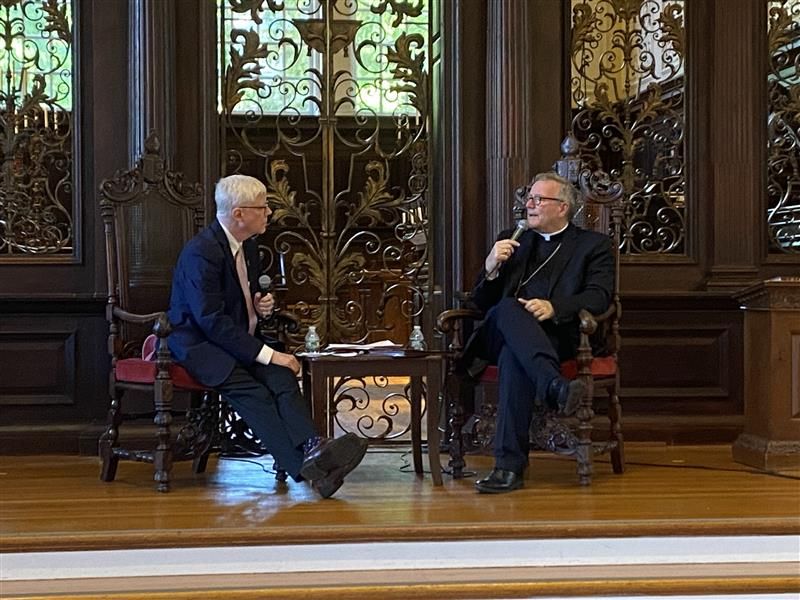
Washington, D.C. Newsroom, Oct 2, 2021 / 11:19 am (CNA).
The Apostolic Nuncio to the United States, Archbishop Christopher Pierre, asked the governor of Missouri on Monday to spare the life of Ernest Johnson, a man sentenced with the death penalty for murdering three people in the 1990s.
“In the Holy Father’s name,” Archbishop Pierre wrote to Governor Michael Parson, “I sincerely request the you halt the planned execution of the Mr. Johnson and grant him some appropriate form of clemency.”
Archbishop Pierre wrote that the Holy Father’s request is not based on “the facts and circumstances of his crimes; who could not argue that grave crimes such as this deserve grave punishments?”
Johnson, who was trying to rob a convenience store for drug money, killed three employees: 46-year-old Mary Bratcher, 57-year-old Mable Scruggs, and 58-year-old Fred Jones, the Associated Press reported.
“Rather, His Holiness wishes to place before you the simple fact of Mr. Johnson’s humanity and the sacredness of all human life,” the nuncio wrote.
Archbishop Pierre noted that “all of society benefits” when any form of violence is restrained, “even the violence of a legal execution.”
Citing Pope Francis’ encyclical Fratelli tutti, Archbishop Pierre wrote: “Do not let the atrocity of their sins feed a desire for vengeance, but desire instead to heal the wounds which those deeds have inflicted.”
The nuncio acknowledged the “courageous stands in support of the dignity of life” that Missouri has made, referring to the state’s pro-life record for protecting life at its “earliest and most vulnerable stage.”
“For this we are very grateful,” Archbishop Pierre added.
He implored Parson to reject the implementation of the death penalty, because “it would be an equally courageous recognition of the inalienable dignity of all human life.”
Once again highlighting the Holy Father’s words, Archbishop Pierre wrote, “If I do not deny the human dignity of the worst criminals, I will not deny human dignity to anyone.”
The archbishop concluded, “Is not a universal recognition of our sacred human dignity the best possible defense for society against the war and violence in our world.”
Johnson, 61, is scheduled for lethal injection Oct. 5, the AP reported
There is debate over whether Johnson is intellectually disabled, which could stop his execution.
Jeremy Weis, Johnson’s public defender, said Johnson meets the appropriate and clinical requirements of intellectual disability and has also consistently shown an IQ range of 67 to 77 in multiple tests, the AP wrote.
The Missouri Supreme Court denied a petition from his lawyers that argued his execution would be cruel and unusual based on his intellectual disability, the Kansas City Star reported.
The Star also reported the court ruled that Johnson “‘failed to prove he is intellectually disabled.’”
Johnson’s lawyers previously argued before the Missouri Supreme Court asking for death by firing squad, citing Johnson’s brain tumor, the AP reported. His lawyers argued the tumor could cause a painful death by lethal injection.
The court denied the request, saying that the state prohibits death by firing squad. They also refused to halt the execution based on concerns regarding the lethal injection drug.
Johnson has been on death row three times, according to the AP.
In 2001 Johnson was scheduled for the death penalty but the U.S. Supreme Court ruled that executing the mentally ill was unconstitutional. In 2003, a new hearing was given to Johnson, where he was again sentenced to death. The sentence was overturned by the state and in 2006, he again was sentenced to death.
If you value the news and views Catholic World Report provides, please consider donating to support our efforts. Your contribution will help us continue to make CWR available to all readers worldwide for free, without a subscription. Thank you for your generosity!
Click here for more information on donating to CWR. Click here to sign up for our newsletter.





Several years ago, Archbishop Christophe Pierre did not bother to respond to my letter to him. I had written concerning my personal knowledge of an instance of clerical sexual abuse that was swept under the rug by the Diocese of Pittsburgh. Apparently, the “humanity” of the innocent adolescent in question was not equal to that of a triple-murderer.
Like any other letter coming from Francis or one of his emissaries, this one should be dispatched to the round file without delay.